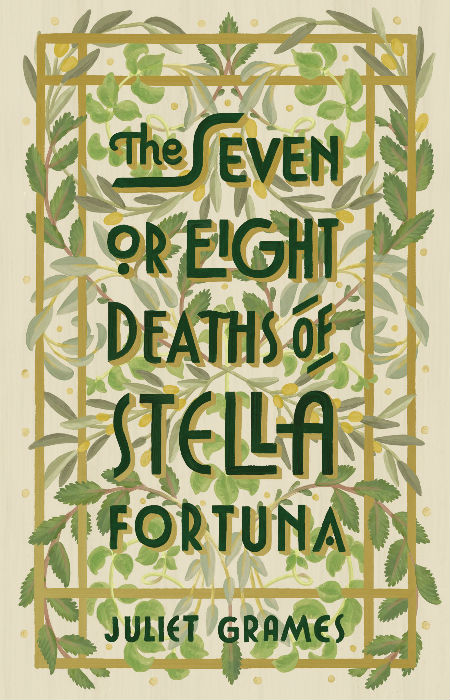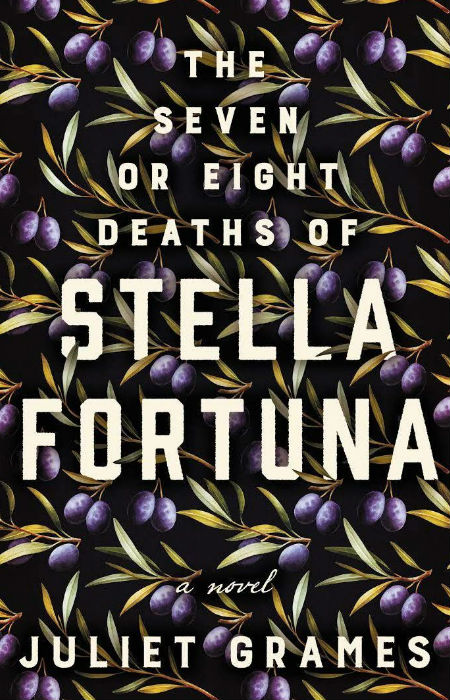
A title like The Seven or Eight Deaths of Stella Fortuna might lead you to suspect that this remarkably-involving novel by Juliet Games is one whimsically quirky moment after another, a tale of one woman staring death in the face multiple times and somehow living to tell the tale.
But while there are idiosyncratic and offbeat elements to the novel, with the overall narrative flavour of the story being one of conversational warmth, wry amusement and familial closeness – the book is presented as a family history of Stella and her family, recounted by her great-niece – there’s also a great deal of devastatingly real life living in the mix which brings them down to earth with a solid, sometimes confronting thump.
This delivery of the mulitfaceted highs and lows of life via a chatty tone sounds like it shouldn’t work but it does so, beautifully and quite movingly at times, serving up a story that is at times enraging, saddening, humbling, very real and relatable since none of us, much as we wish for them, have perfect lives or families with which to live them.
Stella, like many of us, far from the person she wants to be or living the life she wants.
Much of that can be slated down to being born in the early part of the 20th Century in rural Calabria, Italy, where the world might have changed but precious little has reached the superstitious, Catholic village of Ievolo where men rule the roost, women are supposed to know their place, and life options are determined by long-held and never-debated traditions rather tahn modern notions of freewill or personal fulfilment.
“The second Stella Fortuna’s second death was probably the most dramatic—eviscerations generally are. It all came about because poor Assunta, who had been abandoned by her husband and without a lira to her name, had suddenly come into just a tiny bit of relative prosperity and tried to use it to make life richer for her children. Poverty is dangerous, but prosperity, too, can be deadly, especially when a person blinds themselves to its pitfalls.” (P. 57)
While a great many people take comfort in the surety and security of a world with such strictly and unchangingly-enforced parameters, Stella, born to Antonio, a WW1 veteran who is very much of his time and cruelly so, and Assunta, a sweet, caring woman with set ideas on what a wife and mother should so, is not one of them.
Left to her own invoices, this accidental eldest child – to explain why would be one spoiler too many; suffice to say, it’s a soberingly moving tale – who refuses to learn to cook or get married in contravention of the conventions of the time, would have pursued a life on her own terms.
But life, especially for a woman in a traditional Italian family which stays that way even in the move from the old world of Calabria to the new world of Hartford, Connecticut, is never quite that simple nor so easily unconstrained, and Stella is forced into all kinds of difficult situations for which there are no easy solutions or indeed, any solutions at all.
This inability to impact her life in any appreciable fashion, partly forced on her by circumstances but also by her own unyielding unbending nature – in many ways this is an admirable trait but encircled as she is by unthinking tradition which brooks no appreciable interference or amendment, it becomes a liability of sorts (though you’re always impressed that she knows her own mind) – leads to some joy but also great heartache as Stella struggles to reconcile what she knew she wanted her life to be with what it actually ends up being.

The whimsical part of a story comes in with the recollection of the many ways Stella comes close to dying throughout her life.
These incidents are recounted in an affectionately familiar way, very much in the way that the story would be told by wistful family members sitting around and recalling the amusing or soberly serious high and low watermarks of their shared history.
In that respect, they are amusing, but they are also very darkly revealing, pulling back the curtain on the lives of Stella and her immediate family in a way that makes you realise how little control many people have over the trajectory of their lives.
But it’s also a reassuring reminder that for all the dark and flawed moments, there is something intrinsically good about belonging to a family, even if there are people in it you wish weren’t there, and in fact, would simply go away.
Proof of that is the great-niece in question who is the child of Stella’s only daughter, Bernadette, and who, despite the many other fractures in the family, remains close to Stella’s devoted younger sister Tina whose life is similarly constrained but who reacts to it the many things that devil both she and Stella in wholly different ways to that of her sister.
“Stella never had a life goal before, a specific precious thing she badly wanted, the way her father had wanted to be American, or her mother wanted a house, or Tina wanted a baby. But now Stella had something else, the pure, irrefutable knowledge that there was nothing she wanted at all. Not only did she have nothing left to lose, she had nothing left to win, either.” (P. 320)
For all the darkness and gloom that pervades The Seven or Eight Deaths of Stella Fortuna, there is a remarkable lightness of tone to the entire book, one that reminds you of Scandinavian songs which often have an upbeat tune to introspectively truthful lyrics.
It is a case of a spoonful of sugar making the medicine go down, a lesson that Grames has clearly learned well couching some very intense familial events in the context of a warmly-told, affectionately-told tale that never skirts the truth or minimises its darker elements in any way but which is also cognisant of the fact that life is flawed, we are flawed and thus our families are flawed, and pretending otherwise is a fool’s errand.
The remarkable thing is that Grames frankness about the grim realities of living carries great impact without once feeling like sacrificial slog through a sea of terribly heavy words; in fact, the tone feels lightly, involvingly immersive, and as a result, there are times when you will stop and wonder how the terriblness of some people and their awful actions can sit so well in a tale that feels so light and conversational.
But it works, and works magnificently well, a tale told with such surety of tone and assuredness of content and message that you will marvel at the storytelling ability of Grames who fashions a universal tale of family that feels utterly unique and beautifully accessible, and yet brilliantly one-of-a-kind and very much of its culture and time.
As family sagas go, The Seven or Eight Deaths of Stella Fortuna has it all – shocking evil, gross negligence, warmth, joy, hope and disappointment, vibrantly-realised characters, sage lessons, beautiful writing that is down-to-earth as it honest, and an understanding that we rarely get what we want in life and that how we react to it is as individual and different as the families in which these myriad of unexpected events take place.
